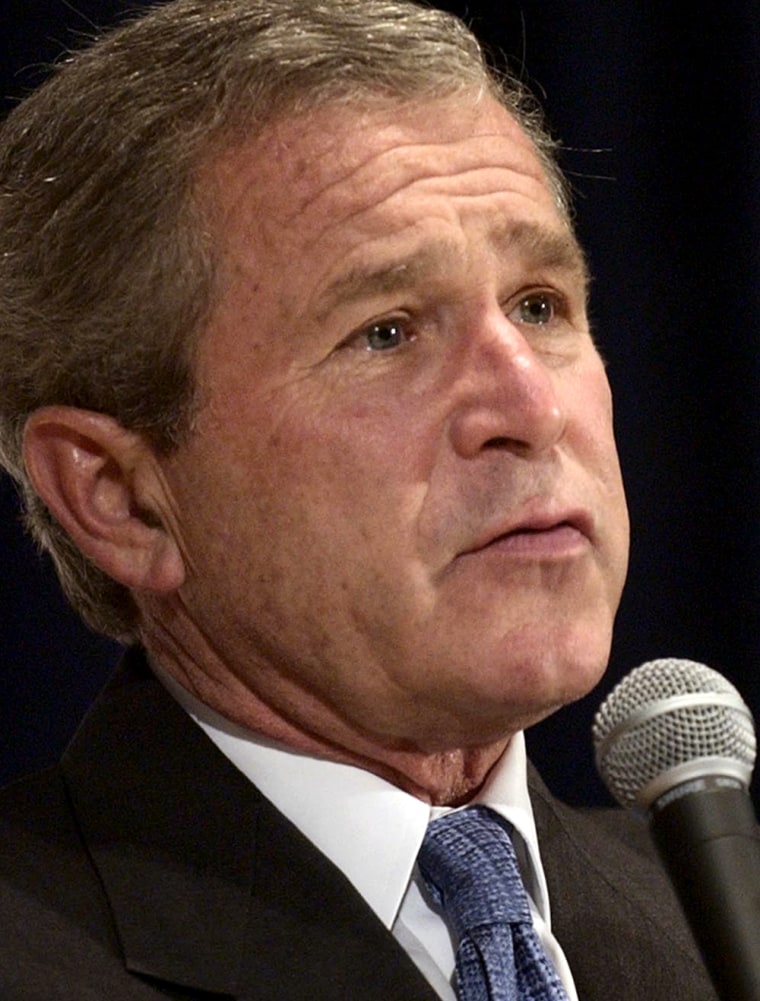Voters may not yet be ready to flock to challenger John Kerry, but President Bush’s continuing decline in opinion surveys — including one released Wednesday — is a clear warning sign for an incumbent trying to persuade the public to rehire him for four more years, pollsters say.
A new Pew Research Center poll Wednesday showed Bush’s approval rating at 44 percent, down from 48 percent a month ago and 58 percent in January. While the poll gives Kerry a 50-45 lead over Bush in a two-way race with a 2.5-point margin of error, his lead narrows to 46-43 when Ralph Nader is included.
But writing in an op-ed piece in the New York Times on Wednesday, Pew director Andrew Kohut said, “There is no reason to expect a one-to-one relationship between public disaffection with the incumbent and an immediate surge in public support for his challenger.” First, Kohut said, voters will “decide whether the incumbent deserves re-election; only later do they think about whether it is worth taking a chance on the challenger.”
Wednesday’s poll is just one of several recent polls that show Bush’s approval ratings slipping below 50 percent amid growing doubts among voters about his handling of the war in Iraq and of the economy.
Growing majorities believe the country is headed in the wrong direction, a traditional early indicator of the electorate’s mood.
'Dangerous territory'
“He is in dangerous territory now,” pollster John Zogby said of Bush.
Frank Newport, editor in chief of the Gallup poll, said Bush’s slowly sinking job approval rating, down to 46 percent in his latest survey, was similar to the dropping trajectory of the last three incumbents to lose their elections -- George Bush, the current president’s father, Jimmy Carter and Gerald Ford.
In contrast, the five most recent incumbent presidents who won their elections never dipped below 50 percent in their job approval rating at any point in the election year, he said.
“The Bush campaign has to be concerned and worried at this point,” Newport said. “When you look at the trend, you certainly see that Bush is beginning to track the trajectory of the three losing presidents rather than the winners.”
The 46 percent who approved of Bush’s handling of the job in Monday’s Gallup poll was the lowest of his presidency. An NBC/Wall St. Journal poll last week put his approval rating at 47 percent, with 49 percent saying he did not deserve re-election and 50 percent saying the country was headed in the wrong direction.
Low approval and re-election numbers are particularly bad for an incumbent, who already is well known to voters. Undecided voters, who have had plenty of time to evaluate the incumbent, often break heavily for the challenger.
Growing disapproval
Polls have found growing majorities of Americans, confronted daily with depressing pictures of death in Iraq and abuse of Iraqi prisoners, disapprove of Bush’s handling of Iraq and of the economy.
Pew pollsters found that “the Iraqi prison scandal has registered powerfully with the public — fully 76 percent say they have seen pictures depicting mistreatment of Iraqis by U.S. soldiers. There also has been a sharp rise in the number of Americans who think the military effort in Iraq is going badly. For the first time, a majority of Americans (51 percent) say the war is not going well and the percentage saying the war was the right decision continues to inch downward. The survey was conducted before release of a videotape showing the decapitation of an American in Iraq. For all that, however, public sentiment continues to run against an immediate withdrawal of U.S. troops from Iraq. By 53-42 percent, Americans favor keeping the troops there until a stable government is established. That number has changed little since early April, after four U.S. contractors were murdered and their bodied desecrated.”
The plummeting faith in Bush’s Iraq policies threaten to turn one of his strengths — his leadership in a time of war — into a weakness, while voters rank the struggling economy as the nation’s biggest problem but have little faith that Bush can fix it.
Despite signs of renewed job growth and economic expansion, voters are still pessimistic and worried about jobs, inflation and slumping stock markets, pollsters said. The NBC poll found 60 percent thought the economy would be in trouble in the future.
“It takes some pretty sustained good news for public perceptions of the economy to pick up,” said poll analyst Karlyn Bowman of the American Enterprise Institute.
That could be particularly worrisome for Bush, who saw his father’s 1992 re-election bid founder on voter worries about the economy — even as economic indicators already were beginning to improve.
The Bush campaign, where pollster Matthew Dowd has frequently predicted Bush’s ratings would fall, said the recent numbers were not a cause for alarm.
'Polls will fluctuate'
“We understand that polls will fluctuate. The most important poll happens on Nov. 2,” said Scott Stanzel, a campaign spokesman. “We have always said the election will be close —potentially as close as 2000.”
Kohut of the Pew center pointed out in his Times piece that the lack of a direct correlation between an incumbent’s decline in the polls and a challenger’s ascent was “the same … in the 1980 race. President Jimmy Carter's favorable rating in the Gallup surveys sank from 56 percent in January to 38 percent in June, yet he still led Ronald Reagan in Gallup's horse-race measures. For much of the rest of the campaign, voters who disapproved of Mr. Carter couldn't decide whether Mr. Reagan was an acceptable alternative.”
“Similarly,” Kohut wrote, “in May 1992 President George H. W. Bush had only a 37 percent approval rating according to a Times Mirror Center survey, but the same poll showed him with a modest lead, 46 percent to 43 percent, over Bill Clinton. Only the Democratic convention and the debates brought about an acceptance of Mr. Clinton.”
